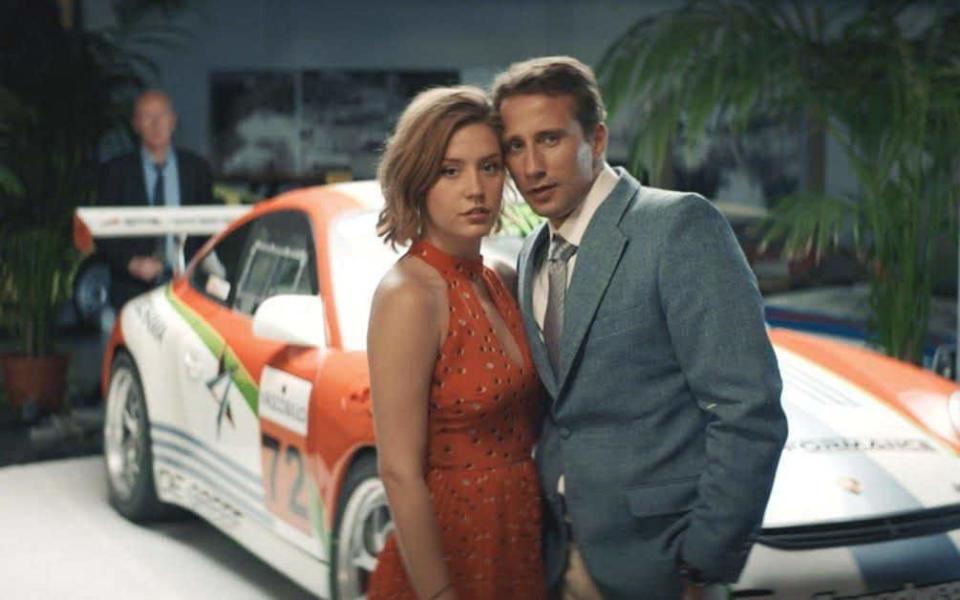Racer and the Jailbird review: a Scorsese-lite thriller that quickly loses speed

Dir: Michaël R. Roskam. Cast: Matthias Schoenaerts, Adèle Exarchopoulos, Eric De Staercke, Jean-Benoît Ugeux, Nabil Missoumi, Thomas Coumans. 15 cert, 127 mins
Racer and the Jailbird, on paper, promises to be a good deal sexier and more high-octane than the film it winds up being. It has Belgium’s reigning film star, Matthias Schoenaerts, as a bank robber, and Adèle Exarchopoulos, from Blue is the Warmest Colour, as a racing-car driver – both rebellious thrill seekers lacking a soulmate. They meet on the tracks as the film starts, and don’t mess around: 10 minutes in, they’re naked in bed together.
Perhaps certain earlier sex scenes the stars have shot sets this one a high hurdle to clear, but it’s an awfully brief, softcore affair, over practically before it has begun. The same certainly couldn’t be said for the film in general. As the couple grow closer, and the criminal endeavours of Schoenaerts’s Gino threaten their future happiness, the filmmaking grows ever limper and less urgent, climbing down gears to leave the engine idling at many of the moments when it really needs to accelerate.
The grittily melodramatic nature of this romance calls to mind several of Jacques Audiard’s pictures, notably Rust and Bone (2012), in which Schoenaerts and Marion Cotillard hooked up. But it actually returns this star to the director who put him on the map: Michaël R. Roskam, who coaxed a bruising performance out of him in 2011’s Oscar-nominated Bullhead, and then a career-best one from Tom Hardy, alongside him, in the underrated The Drop (2014).
Clenched and credible, Schoenaerts’s acting isn’t exactly unfamiliar from those contexts. It’s the ever-lively Exarchopoulos who feels like the fresher participant, albeit in a role that dumps her nagging on the sidelines for way too much of the running time.
Roskam, rarely hiding his open debt to Scorsese, makes films about reluctant criminals stuck in a funk of machismo, knuckling down as far as possible to escape their brutal destinies. And Gino certainly fits this pattern – almost too much so. He can’t say no to the dodgy old cohorts who keep dragging him back into one job after another, even with a new fiancée on the scene, who warns him, without full knowledge of what he’s doing, that the old life must cease.
The film peaks midway with a one-last-job gamble of the kind so beloved of the heist genre, and it’s a well-assembled sequence: an assault on an armoured car, involving numerous vehicles and a shipping container tipped off a motorway bridge. Roskam flexes his technical muscle here and gets our pulses racing; it’s just a shame that nothing in the film’s back end comes near to matching it.
There’s a third-act cancer twist, an attempted prison escape, and sadistic fisticuffs in store, every one of which feels like been-there-done-that boilerplate. What stymies the film almost more, though, is its most effortfully auteurist touch. The Drop had an important role for a rescue dog, as a symbol of broken survival, and of a certain feral instinct for love. This film spells out to a yawnsome degree how Gino fears them, because of the vicious ones he grew up with, and a certain philosophy learned from his father’s treatment of a poor cocker spaniel.
So: he has a staring match with one dog. He kicks out at another, on prison leave, and it’s nearly his downfall. He fights a third at the end. Mutts are becoming to Roskam what white doves were to John Woo, except that this script makes such a meal of their meaning, it’s as if he's handing out treats to every canine extra he can get his hands on.

